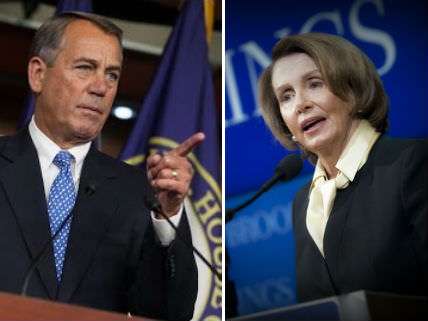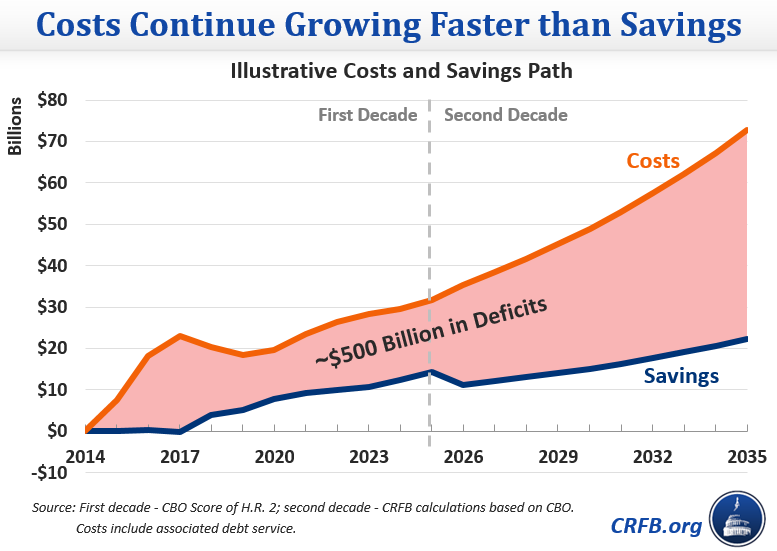The Permanent Medicare Doc Fix: A Bipartisan Agreement to Blow Up the Budget

This is what bipartisanship looks like: a $500 billion increase in the deficit in order to please a favorite constituency. A permanent "fix" to Medicare's physician reimbursement formula, the Sustainable Growth Rate (SGR), passed in the House today on a 392 to 37 vote.
The deal does what many, including at times myself, believed for years was all but impossible: It repeals the SGR, which for the last decade-plus has called for significant cuts to physician reimbursements. These cuts that have always been overridden on a bipartisan basis, and there has always been bipartisan support for ending the doc fix charade. Doctors hated it too.
So it's not too surprising to find that the deal was crafted jointly by Republican Speaker of the House John Boehner and Democratic Minority Leader Nancy Pelosi, with backing from the doctors lobby. Opposition from Senate Democrats seems to be waning, and President Obama has issued a statement suggesting he's likely to sign the deal.
The bill, as passed, however, is a budget buster, according to the Congressional Budget Office, which estimated that it increases the deficit by $141 billion over the next 10 years. Supporters argue that the plan's savings materialize over the long term, but an estimate by the budget watchdogs at the Committee for a Responsible Federal Budget found that the fix, which increases Medicare means testing and also sets up regular increases in doctors' Medicare payments, would actually add $500 billion to the debt over the next 20 years.

It's not the worst possible fix; the additional Medicare means testing will make some seniors pay for a larger share of their entitlement benefits, and exert some hopefully real long-term downward pressure on the program's unfunded liabilities. As the Cato Institute's Michael Cannon, who isn't entirely thrilled with the deal, writes, "if you're going to be totally fiscally irresponsible, this is the way to do it." That's right, I think.
The big takeaway here is that it's the total fiscal irresponsibility that makes a bipartisan deal like this possible. Permanent doc fixes had always failed in the past because there was no way to pay for them, or at least no way that enough members of Congress could agree on. The reason this finally passed, after years of fruitless debate and discussion, was that they were all able to agree on an alternative solution: not paying for it. That's bipartisanship in action.
Editor's Note: As of February 29, 2024, commenting privileges on reason.com posts are limited to Reason Plus subscribers. Past commenters are grandfathered in for a temporary period. Subscribe here to preserve your ability to comment. Your Reason Plus subscription also gives you an ad-free version of reason.com, along with full access to the digital edition and archives of Reason magazine. We request that comments be civil and on-topic. We do not moderate or assume any responsibility for comments, which are owned by the readers who post them. Comments do not represent the views of reason.com or Reason Foundation. We reserve the right to delete any comment and ban commenters for any reason at any time. Comments may only be edited within 5 minutes of posting. Report abuses.
Please to post comments


Bipartisan = expensive.
And almost certainly anti-liberty.
The "BUTT DOO
Goddamit, Reason, what the hell?
I was appealing to the "do something" [il]logic.
I dunno, i feel like BUTT DOO is a totally appropriate response.
Correction:
The Permanent Medicare Doc Fix: A Bipartisan Agreement to finally be a little more transparent on the actual fiscal cost of Medicare because anyone with two brain cells knows those provider reimbursment cuts were never happening.
I didn't know Lucy van Pelt grew up and made her career in healthcare policy.
See, when savings are supposed to materialize over the long term, that means they want to give people time to figure out the loopholes and workarounds to make sure those savings never really happen.
Because "savings" to the government are "cuts" to the people cashing the checks. And that ain't gonna happen.
the Congressional Budget Office, which estimated that it increases the deficit by $141 billion over the next 10 years[, while] the Committee for a Responsible Federal Budget found that the fix ... would actually add $500 billion to the debt over the next 20 years.
So, by any estimate, peanuts. Let 'er rip!
Whenever Congress is united the People always lose. Yipeee.
So...the very first time in 6 years that the ENTIRE government agreed on something?
Hang on to your wallets...it's going to be expensive.
So, spend it now to fix something that should have never been allowed to happen, but did, because the "smoke and mirror" it provided "balanced" the budget, even though the annual Doc Fix undid that balance - and complaints arise because an action is taken to avoid this Kabuki Theatre in the future.
Stop letting the perfect be the enemy of the good.
And, how in the hell is medicare/medicaid going to survive without the participation of doctors, whose current payment schedule is a discouragement to accept any patients under those programs?
Articles like this drives me nuts.
How can you increase the deficit by any amount over ten years when the deficit is defined as the difference between revenues and expenditures on a yearly basis?
This whole "over ten years" budget calculation is ridiculous. No one knows how much the budget will be ten years from now, or how much we will be trying to spend.
These "over ten years" budgetary statements are the epitome of smoke-and-mirrors government speak and for "journalists" to go along with it shows how we are simply not dealt with as thinking people.
It actually cost nothing. We are already paying for the SGR shortcomings from emergency funding bills every year. The problem with this bill is that it just killed private practice. It introduced 200 more regulations and forces doctors to participate in "value/merit based" pay schedules over the next three years. This means that doctors still get the hassles of billing and appealing denials of claims, but when they do get paid, at least 1/3 of the check goes to the ACO (Which is almost always the local hospital) who then determines how much of it you get to have based on useless government designated merit/ value criteria. Not only do doctors face a third party payor middle man, but now they also have to appeal to the ACO to get paid and even to continue working. If the ACO does not feel that spending money on elective hernia procedures is as important as labor and delivery, then you will have to make a case for why your metrics do not adequately demonstrate the value of the care you provide. Great bipartisan work, socialized medicine is now about 3 years away instead of 10.